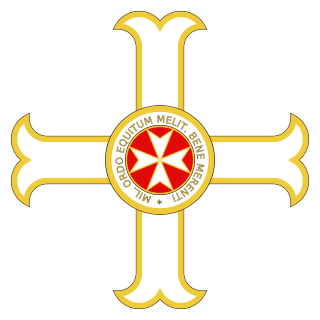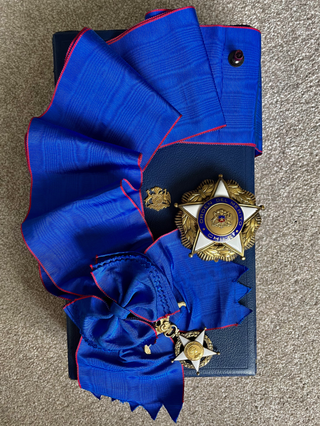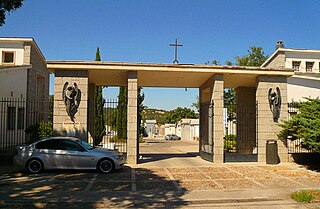
The Dominican honours system is a means of rewarding individuals' personal bravery, achievement or service to the Dominican Republic. The system consists of two types of awards: decorations and medals.

The Dominican honours system is a means of rewarding individuals' personal bravery, achievement or service to the Dominican Republic. The system consists of two types of awards: decorations and medals.
These were introduced within the Rafael Trujillo regime. Some of them were named after him; those were rescinded after his death on 30 May 1961.
These are the orders and medals actually awarded by the government of the Dominican Republic:
The following orders and medals were awarded by the government of the Dominican Republic until the death of Rafael Trujillo:

Rafael Leónidas Trujillo Molina, nicknamed El Jefe, was a Dominican military commander and dictator who ruled the Dominican Republic from August 1930 until his assassination in May 1961. He served as president from 1930 to 1938 and again from 1942 to 1952, ruling for the rest of his life as an unelected military strongman under figurehead presidents. His rule of 31 years, known to Dominicans as the Trujillo Era, was one of the longest for a non-royal leader in the world, and centered around a personality cult of the ruling family. It was also one of the most brutal; Trujillo's security forces, including the infamous SIM, were responsible for perhaps as many as 50,000 murders. These included between 12,000 and 30,000 Haitians in the infamous Parsley massacre in 1937, which continues to affect Dominican-Haitian relations to this day.

Francisco Higino Craveiro Lopes was a Portuguese Air Force officer and politician who served as the 12th president of Portugal from 1951 to 1958.

The Order of Merit of Duarte, Sánchez and Mella is the principal order of the Dominican Republic. It was established on 24 February 1931 as the Juan Pablo Duarte Order of Merit and renamed on 9 September 1954. The Head of State confers the order both to civilians and military personnel for distinguished services.

An order of merit is an honorific order that is conferred by a state, government, royal family, or other sovereign entity to an individual in recognition of military or civil merit. The historical background of the modern honours system of orders of merit may be traced to the emergence of chivalric orders during the Middle Ages.
The Order of Christopher Columbus is an order of the Dominican Republic. It was established on 21 July 1937. The Head of State confers the order, by advice of the council of the order, both to civilians and military personnel to recognize services.
Dr. Rafael Molina Morillo was a lawyer, journalist, diplomat, and newspaper editor from the Dominican Republic. He created Ahora! Publications which published El Nacional newspaper and Ahora! magazine. He also was editor of Listín Diario newspaper and El Dia, a free newspaper in the Dominican Republic.
The Parsley massacre was a mass killing of Haitians living in the Dominican Republic's northwestern frontier and in certain parts of the contiguous Cibao region in October 1937. Dominican Army troops from different areas of the country carried out the massacre on the orders of Dominican dictator Rafael Trujillo.
Portugal has a system of orders, decorations, and medals as a means of honouring individuals for personal bravery, achievement, or service to Portugal.
The Dominican Party was the de facto only permitted political party in the Dominican Republic during the dictatorship of Rafael Trujillo, who ruled the country from 1930 to 1961. Its symbol was a palm tree.

Orders, decorations, and medals of the Socialist Federal Republic of Yugoslavia were created during the Second World War and used throughout the existence of the Socialist Federal Republic of Yugoslavia. The first decorations were created by AVNOJ on August 15, 1943 and included the Order of the People's Hero, Order of the People's Liberation, Order of the Partisan Star, Order of the Brotherhood and Unity, Order for Bravery and Medal for Bravery. By 1960 the total number of decorations increased to 42 and consisted of 35 orders, 6 medals and 1 commemorative medal. The designers of the Yugoslav orders and medals were Antun Augustinčić and Đorđe Andrejević Kun.

The Order of Merit is a Chilean order and was created in 1929. Succeeding the Medal of the Merit, which was created during the term of the President Germán Riesco through the Minister of War decree No. 1350 on 4 September 1906. This new national distinction was created to recognize the meritorious service provided by foreign military personnel to Chilean officials. The order is only awarded to foreigners.
The Order of Trujillo was the second principal order of the Dominican Republic, after the Order of Merit of Duarte, Sánchez and Mella. It was established on 13 June 1938 in honour of the then-President Generalissimo Rafael Trujillo. The Head of State conferred the order both to civilians and members of the military for distinguished services, regardless of Dominican Republic citizenship.
The Order of Military Merit is an honour awarded to members of the Military of the Dominican Republic. It was established on 15 November 1930.
The Chilean honours system provides a means for the Government of Chile to reward gallantry, achievement, or service, by both Chileans and non-citizens. The honours system consists of three types of award: orders, decorations and medals. Membership of an Order is conferred to recognise merit in terms of achievement and service. Decorations are conferred to recognise specific deeds of gallantry, bravery, distinguished or meritorious service. Medals are conferred to recognise long and/or valuable service and/or good conduct. Awards to non-citizens are usually only made where the gallantry, achievement or service has advanced Chilean interests in some way. The honours conferred by the Chilean Republic can be divided into two groups: civil and military. Military honours are conferred by the different branches of the Armed Forces of Chile. Civil honours are conferred by the President of Chile or, in some instances, by the government minister relevant to the particular honour.

The Ministry of External Relations of the Dominican Republic is the government institution in charge of foreign affairs. It's responsible of coordinating the foreign policy of the Dominican Republic along the President, in accordance with Article 128 of the Constitution. It is commonly known as the Chancellery (Cancillería)

The Mingorrubio Cemetery, also called the Cemetery of El Pardo, is a municipal cemetery on the edge of Madrid, Spain. Mingorrubio is a neighborhood in the northern district of Fuencarral-El Pardo.

Roberto Álvarez Gil is a Dominican lawyer and diplomat. He became Foreign Minister of the Dominican Republic, in the government of President Luis Abinader in August 16, 2020. He is also a researcher and author of publications on human rights and international relations. In 2005, he was Permanent Representative of the Dominican Republic to the Organization of American States.